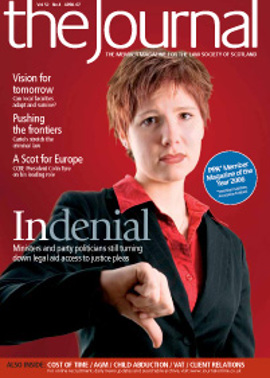Block fees: the story behind the changes

Practitioners who provide civil legal aid will recently have received a letter from the Scottish Legal Aid Board, indicating important changes to the operation of block fees. In light of that letter, those practitioners might be interested to know how these changes were arrived at and what cognisance was given to the views expressed by the Society’s representatives.
In January 2005, the Society provided an initial response to the Board’s report on the strategic review of the delivery of legal aid. The Civil Legal Aid Subcommittee was delegated the task of entering into discussions with the Board with a view to changes being implemented to the block fees.
Problem areas
Following a series of meetings with the Board from May to September 2005, problem areas within the block fees table were highlighted. By September 2005 agreement in principle had been reached between the Society and the Board as to the parts of the fees table which required to be amended. They were as follows:
- The table was considered to be too restrictive, particularly in difficult or contentious family actions.
- There was no provision for payment where a legal aid certificate had been granted but no action had been raised.
- The instruction fee narrative required to be amended.
- The progress fee narrative required to be amended.
- There was underprovision in the table for the preparation for child welfare hearings, and no fee for a continued welfare hearing. There was also no provision for an evidential child welfare hearing.
- The narrative of the block court fees required to be altered so as to make provision for rule 18.3 hearings, procedural hearings, peremptory diets and pre-proof hearings.
- The provisions for uplift by way of an additional fee, the narrative and the criteria to be utilised all required to be amended.
- The categories of court work to be carried out exclusive of the block fee table and under the time and line basis required to be amended.
- The whole issue of travel time and the existing mileage radius required to be amended.
- The fees for undefended actions and undefended divorces were far too low.
Unilateral moves
These points formed the basis of further discussions between the Society and the Board and by January of 2006, the Board had produced a revised version of the table incorporating their suggested fee increases. The Society also produced its own version of that table, proposing far higher increases than those suggested by the Board.
It was agreed at that stage that further discussions should take place to see if agreement could be reached regarding the proposed new fees, prior to any formal submissions being made to the Scottish Executive.
Regrettably, no steps were taken by the Board to further those discussions and they submitted their own proposal direct to the Scottish Executive in April 2006. The Society felt that this approach was disappointing given the progress that had been made with the negotiations, and it had no alternative but to submit its own formal proposal to the Executive.
In the latter part of 2006, discussions took place between the Executive, the Board and the Society to consider the proposals from the Board and the Society. The Executive, having considered both proposals, then produced a draft of the Civil Legal Aid (Scotland) (Fees) Amendment Regulations 2006.
Whilst the draft contained and addressed all the issues highlighted above, the Executive had incorporated the majority of the proposals put forward by the Board in relation to fees. Despite further efforts by the Society to persuade the Executive to alter the proposed level of fees, the Executive continued to prefer the views expressed by the Board, and the new fees table was published for implementation on 10 February.
Better table, same balance
In the Society’s view the new table will not lead to practitioners being more inclined to engage a client under a legal aid certificate. Practitioners will find that whilst certain fees have been increased and certain lacunae in the old table have been addressed, the new table will still not provide them with what they view as a reasonable rate of remuneration for certain types of civil legal aid work. In particular, whilst an additional fee will be payable where an action involves a complex financial dispute, a complex pension sharing arrangement or a contentious contact dispute, the additional fee will only be four units.
Despite these reservations, the table does address some issues. It will no longer be necessary to have the court assign a diet of debate or proof to ensure that a progress fee is paid; there are now increased fees for preparation and attendance at an initial child welfare hearing, and a new fee for preparation and attendance at a subsequent or continued hearing; provision is now made for payment where a certificate is granted but no action is raised; and perhaps more significantly, the existing travel restrictions have been removed and travel will now be paid for in its entirety so long as the radius restriction is exceeded.
Disappointment and frustration
What is disappointing is that after significant early progress, the Board then took the decision to make their own formal proposals to the Executive without further reference to the Society. After a considerable amount of time and effort was then expended putting forward the Society’s views, the Executive subsequently chose to accept the proposals put forward by the Board and the Society’s concerns were largely overlooked. It was stressed to both the Board and the Executive at the outset of these discussions that the principal concern of practitioners was that the level of remuneration was far too low in relation to the amount of work being carried out and that this was all the more prevalent in family cases. Whilst these concerns were noted, they were not fully taken into account by either the Board or the Executive and as a result, the new fees will only make a slight difference to the level of remuneration to practitioners involved in this type of work.
During the initial negotiations, fees for summary cause actions and the criteria for uplifts in children’s legal aid cases were also discussed. It will be noted in the new table that the fees for summary cause proceedings have been increased. However there still remains the issue of the implementation of uplifts in children’s legal aid cases. The Society has endeavoured to persuade the Board that these uplifts are both justified and essential in certain types of cases. It made proposals that criteria based on existing guidelines for dealing with sanction applications for counsel should be employed when deciding whether or not to grant uplifts in children’s legal aid cases, but these proposals were roundly rejected by the Board. To date, the Board have simply proposed certain extremely restrictive and, in the Society’s view, unacceptable criteria for granting uplifts, and despite the fact that the Executive indicated as far back as July 2003 that these uplifts would be put in place and backdated, there unfortunately remains an impasse in this respect.
In conclusion, over the last 18 months of negotiations, the Society’s representatives have felt increasing frustration that even although they are experienced practitioners in this field, their views, while listened to, seem to be overlooked by the Executive if there is a divergence with the views of the Board. In addition, there is an increasing sense of disillusionment that neither the Board nor the Executive, despite numerous reports to the contrary, seems prepared to accept that the initial reform process has not achieved its financial objective.
Mark Thorley is convener and Grant Knight a member of the Civil Legal Aid Subcommittee
In this issue
- The bigger picture
- Citizen justice
- Purely rhetoric?
- Purely rhetoric? (1)
- Profit, team by team
- Bring them home
- Bring them home (1)
- Local roots
- Wanted! (for conspiracy)
- One voice
- AGM report
- Dealing positively with client concerns
- Block fees: the story behind the changes
- Think before you charge
- For the high jump
- Jury questions
- Put to the test
- Yet another expense
- Planning with people
- Lifting the lid
- Website reviews
- Book reviews
- Home is where the heart is
- PSG - new certificate of title
- SEPA: apply online and save
- SEPA: apply online and save (1)






